Red Sono(soro)ridades @ LASA 2023 The Right to Listen
Victoria Polti, Freya Zinovieff, Amanda Guitiérrez, and Laura Balboa members of the RED SONO(SORO)RIDADES presented in LASA 2023 as part of the panel THE RIGHT TO LISTEN: COLONIALITY, AURAL REGIMES AND TECHNOPOLITICAL ACTIVISMS organized by AMANDA GUTIERREZ, chaired by VICTORIA POLTI with GABRIELA ACEVES SEPULVEDA as discussant
The presenters discussed various engagements with sound methodologies, from sound walks (GUTIERREZ), sound ethnographies (ZINOVIEFF), and conversation as praxis (BALBOA) to mycelium performances (POLTI), a territorialization and deterritorialization of the sound and visual archive of transfeminist activism. Each presenter articulated their approximation to the RIGHT TO LISTEN through these various methodologies.
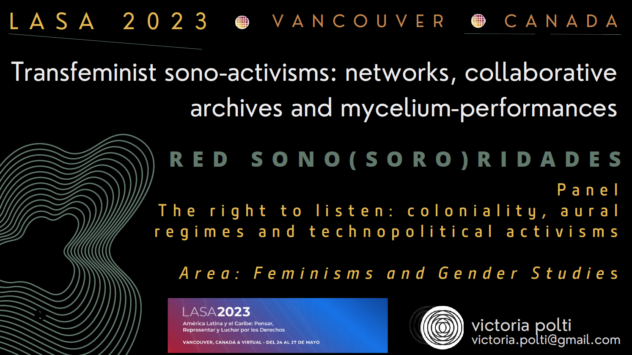
In Feminist Sono-activisms: networks, archives, and mycelium performance, POLTI offered a theoretical walkthrough via Oliveros, Ochoa, Dominguez Ruíz, Voegelin, Eisdheim, Esteves Trujillo, Taylor, Fuentes, Margulis and Citro to prose the term “mycelium performance.”
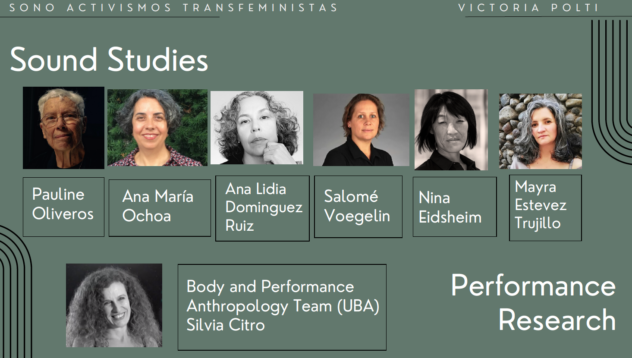
POLTI uses this term to define the sono-activisms/archvisms of Argentinian transfeminist collective VIVAS She invites us to think through VIVAS archival work –which consists of performing, collecting, recording (audio and visuals), uploading and then providing public access to the data– as a constellation of performances or mycelium performances which circulate different affects and political affiliations.
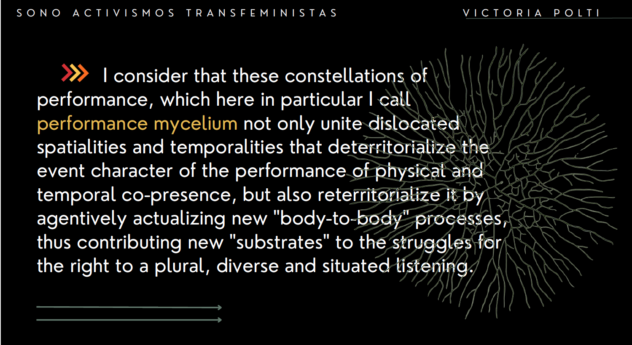
These affects and affiliations constitute an active form of inhabiting listening (Voegelin) or “habitar la escucha.” An action that irrupts the stronghold of the visual by activating the corpo-materiality of sound and, in turn, emphasizing listening as an embodied and sociotechnical phenomenon.
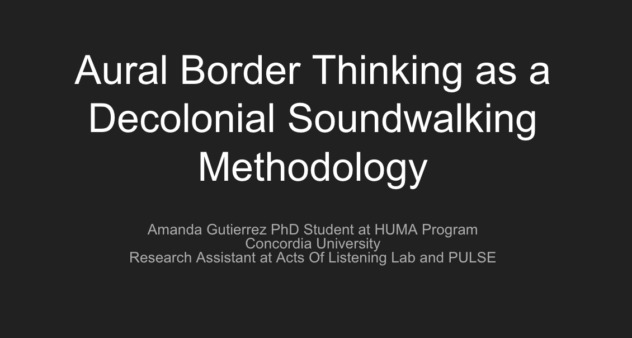
In Aural Border: Thinking a decolonial practice of sound walking from a feminist approach, GUITERREZ described her experiences with soundwalking as a way to connect with her ancestors and provide a platform for intergenerational and situated listening in migrant neighbourhoods.
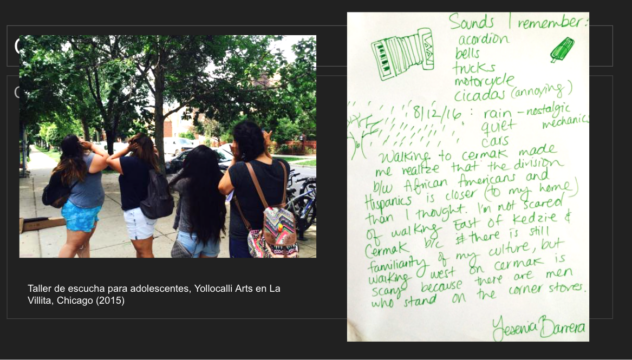
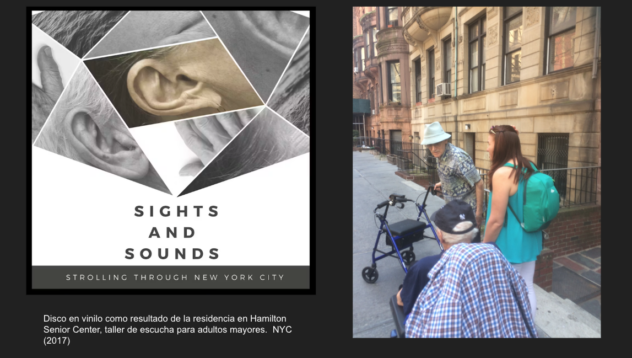
What emerges from GUITIERREZ’s approach to SOUNDWALK is an engagement with Haraway’s SITUATED KNOWLEDGE as a form of SONIC AUTOHISTORIA.
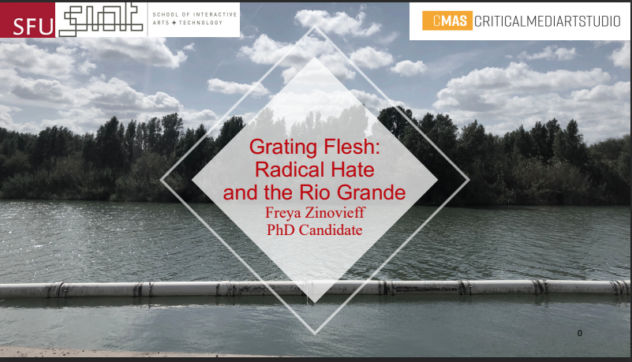
In Grating Flesh, Situated Listening as response to Coastal Borders, ZINOVIEFF shared her sound ethnographic experiences at the RIO GRANDE RIVER.
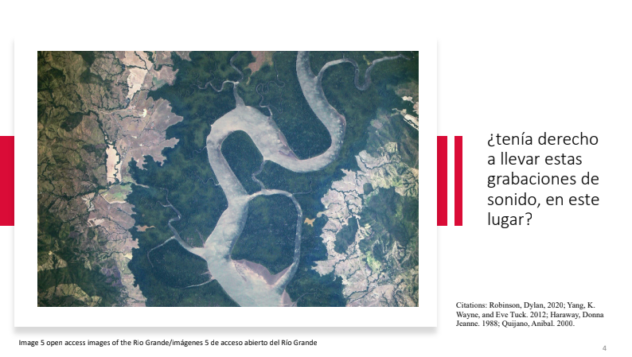
Positioning herself as a White-Settler-Other within the context of the violent landscapes and waterways of the Mexico-U.S. border, ZINOVIEFF asks us what listening does to us. Rather than asking, who has the right to listen? By reflecting on how we listen, and to what we do and do not listen to in the borderlands, ZINVOVIEFF, like GUTIERREZ, invites us to engage in a self-reflexive exercise that following Fúnez-Flores accounts for both alterity and exteriority as integral elements in situated listening. Situated listening as activism can be open to interpretation but does excuse us of our accountability to the land, the other, or the non-human.
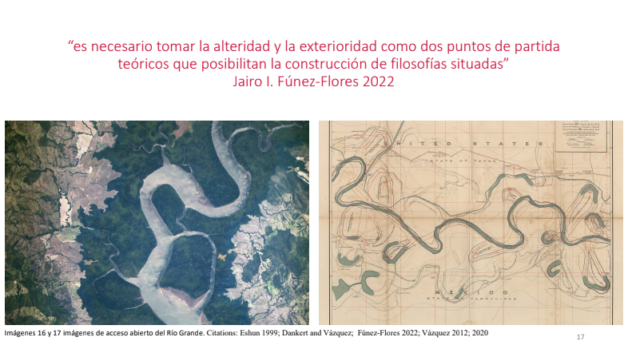
And finally, in Oralidad Diferenciada; Bulla Radio Desde la radicalidad del acto conversatorio, BALBOA shared with us her experiences as host, producer, and designer of RADIO BULLA, a bi-weekly radio program streamed by community radio RADIO NOPAL.
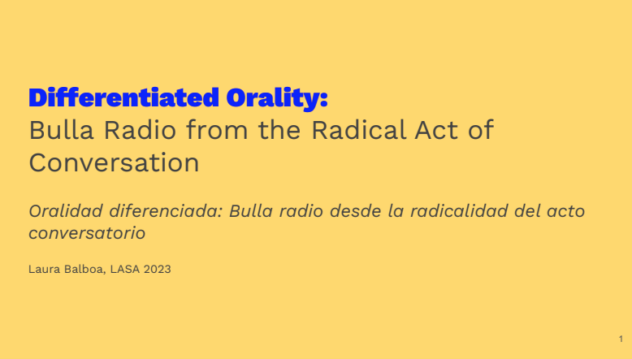
RADIO BULLA is a safe space for women and non-binary experimental sound artists to reflect and document their work. RADIO BULLA also functions as a database of raw data that allows the participants to self-categorize themselves and their practices. Balboa has been analyzing the data via qualitative and quantitative methods to provide a snapshot of the state of the field in terms of access, representation and equity.
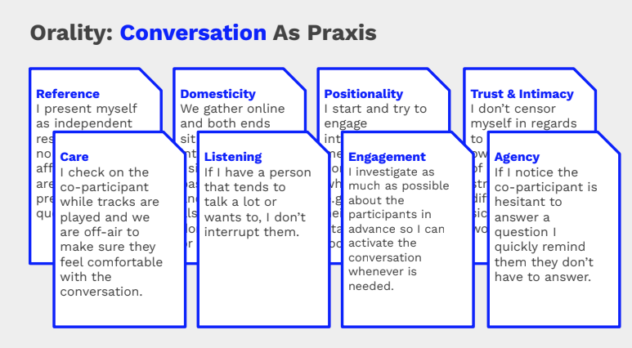
As part of her ongoing research, Balboa described her hosting method and facilitating data collection as CONVERSATION AS PRAXIS. Conversations between Balboa and her guests are the frame that allows her to collect data. She described this praxis as consisting of the following elements: self-referentiality, domesticity, positionality, trust & intimacy, care, listening, engagement and agency. Balboa explains this form of raw data collection as being different from ethnographic and historical data collection methods due to its processual and open-ended state.
We resumed the discussion with Gabriela’s comments which invited all to explore the corpo-material and socio-technical aspects of sound and whether we should explore these issues further in conceiving our approach to situated listening in our ongoing research.
Images: slide presentations by Victoria Polti, Amanda Gutiérrez, Freya Zinovieff and Laura Balboa, in The Right to Listen: Coloniality, Aural Regimes and Technopoltical Activisms in LASA 2023, Vancouver, Convention Center, 25th May 2o23.

